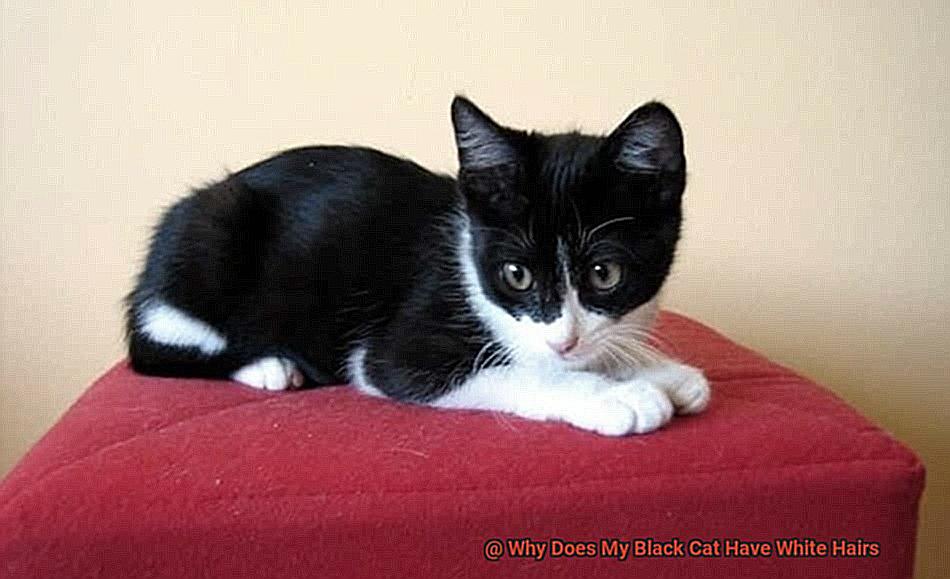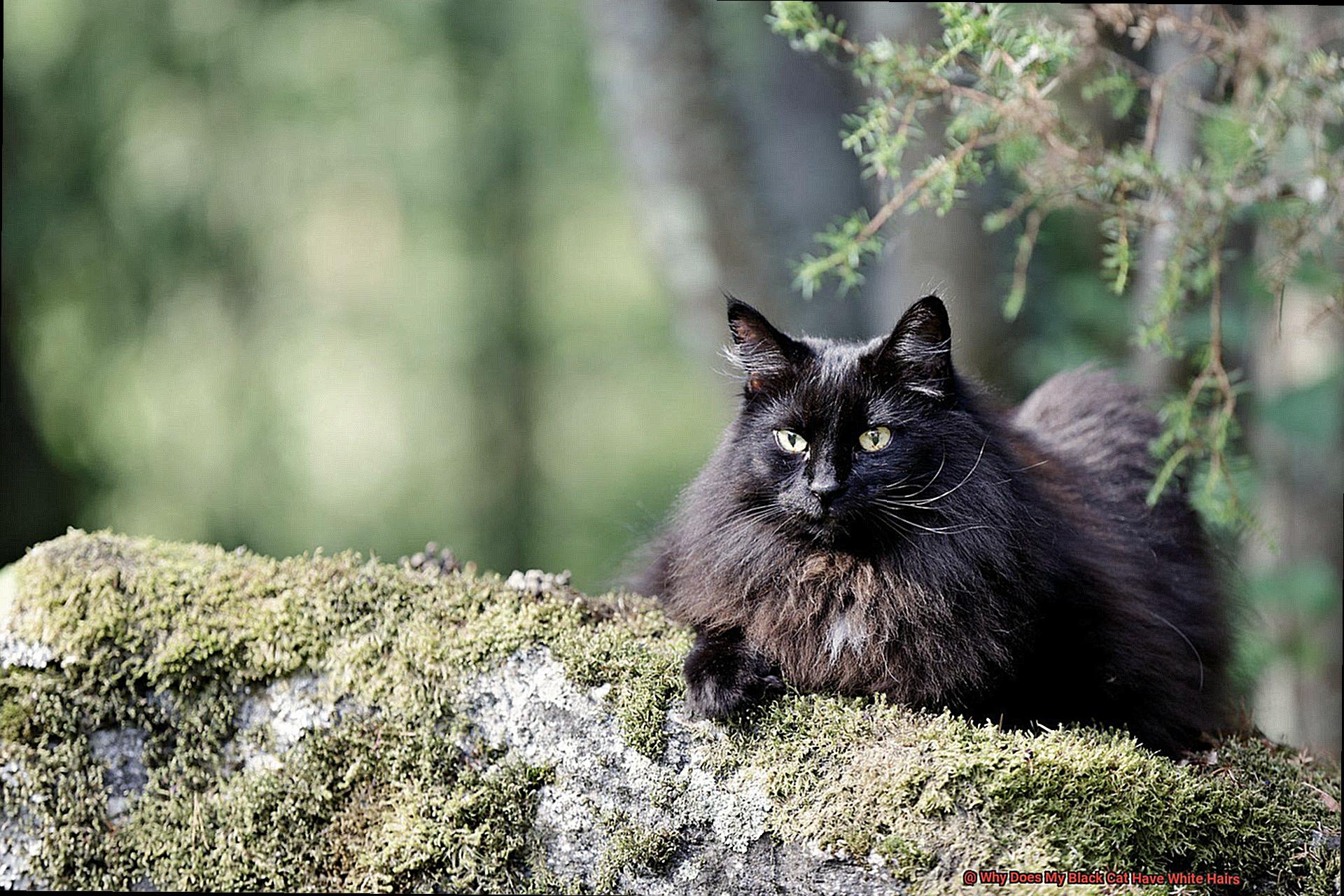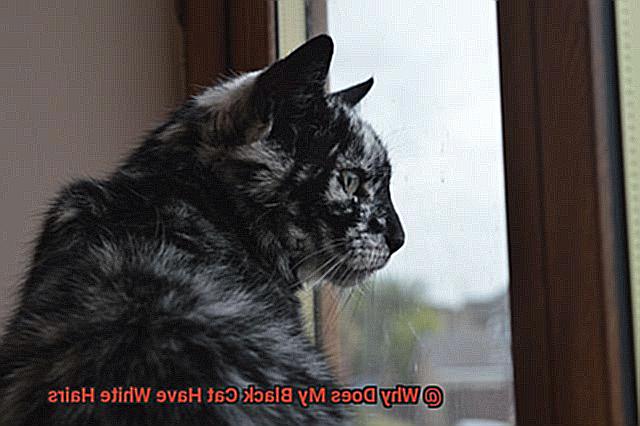Do you have a black cat that’s been showing off some white hairs lately?
No need to worry, as this is a common occurrence among many black cat owners. But the question remains: why do black cats have white hair?
One possible reason could be genetics. Just like humans, cats inherit certain traits from their parents, and coat color is one of them.
Some breeds are more likely to have white hairs in their coats than others, but even cats without the gene can develop them as they age. Stress is another factor that can affect your cat’s coat color.
Cats are sensitive creatures, and if they’re feeling anxious or stressed, it can show in their fur. This is because stress hormones like cortisol can alter the color of the coat.
In this blog post, we’ll delve into the various reasons why your black cat may have white hairs. We’ll explore genetics, stress, aging and more to help you understand this phenomenon better.
So, if you’re curious about your feline friend’s salt-and-pepper look, keep reading.
Age: How Does Age Affect a Cat’s Coat Color?
It’s not uncommon for black cats to develop white hairs as they age, a phenomenon colloquially known as “going grey.” But rest assured, this is a natural part of the aging process and nothing to worry about.
Around 8 to 10 years old, black cats may start growing white hairs due to a decrease in melanin production. Melanin is the pigment responsible for giving color to hair and skin.

As cats age, their melanin production decreases, causing their coat to lighten and develop white or grey hairs. This gradual lightening process can be likened to gold tones in human hair, but for cats.
However, it’s important to note that not all black cats will go grey as they age. Some may retain their solid black coat throughout their entire life, while others may only develop a few white hairs.
The variation depends on genetics and how much melanin your cat produces over time. While going grey is entirely natural, sudden changes in your cat’s coat color or texture should be monitored closely.
These changes could be an indication of an underlying health issue, such as thyroid disease or certain skin disorders. In such cases, it’s best to bring your cat to the veterinarian for a check-up.
Genetics: What is Piebaldism and How Does it Impact Coat Color?
Get ready to learn about this fascinating condition that can transform a cat’s appearance in unique ways.
Piebaldism is caused by a mutation in the KIT gene, which controls the distribution of melanocytes, the cells responsible for producing pigment in the skin and hair. This can result in patches of white fur on an otherwise black coat, creating an eye-catching and distinctive look.
While piebaldism can occur in any breed of cat, it is more commonly seen in breeds such as the Sphynx and Devon Rex. The severity of piebaldism can vary from cat to cat, with some only having small patches of white fur and others having larger areas.

The impact on a cat’s coat color can also vary depending on the severity of the condition. In some cases, the patches may be so small that they are barely noticeable, while in other cases they may be large enough to significantly alter the cat’s appearance.
But piebaldism doesn’t just affect a cat’s coat color. It can also impact other aspects of their appearance such as eye color and skin color.
Cats with piebaldism may have blue or odd-colored eyes and may also have pink or mottled skin. These unique features make them stand out even more.
Although piebaldism does not cause any health problems for cats, it is still important for pet owners to be aware of this condition and how it can influence their pet’s appearance. Any sudden changes in coat color or texture should be monitored closely because they could indicate an underlying health issue.
If your feline friend has small patches of white fur or larger areas, they are sure to turn heads and be the talk of the neighborhood.

Stress: Can Stress Cause Changes in a Cat’s Coat Color?
Stress can actually change the color of your furry friend’s coat.
Keep an eye out for any changes in their coat color as it may indicate that they’re feeling ill at ease. When a cat is stressed, their body releases cortisol, which can alter the pigmentation of their fur.
Black cats, in particular, are susceptible to stress-induced white hairs or even a complete change in coat color to white. It’s almost as if they’re wearing their emotions on their sleeves, or should we say, on their coat.
So what can cause anxiety in cats? Any changes in their environment or routine, such as moving to a new home or introducing a new pet, can be significant sources of stress.
Cats can also become stressed by illness, injury or trauma. Keep an eye out for any sudden changes in your cat’s behavior or coat color.
This could be a sign that they’re not feeling like themselves. If you suspect that your black cat is stressed, there are several things you can do to help them feel more comfortable and relaxed.
Providing plenty of playtime, exercise, and mental stimulation can help reduce stress levels. Additionally, creating a safe and secure space for your cat to retreat to when they need some alone time can be beneficial.
It’s important to note that not all instances of white fur in black cats are caused by stress. Sometimes it may be due to genetics or aging.
However, if you notice any sudden changes in your cat’s coat color, it’s always a good idea to have them checked out by a veterinarian to rule out any underlying health issues. In conclusion, your cat’s coat color isn’t just about looking stunning; it also provides vital insights into their emotional health.
Health Issues: Is There an Underlying Health Issue Causing White Hairs?
Hold on tight as we take a closer look at the potential health conditions that may have contributed to this unexpected change in your feline friend’s coat.
If your cat is young and developing white hairs, it may be due to a genetic condition or a nutritional deficiency. However, if your cat is older and suddenly develops white hairs, it could be a sign of a more serious health issue.
This sudden change in coat color could indicate anxiety, vitiligo, or even thyroid problems. Both humans and animals can suffer from premature graying, and stress is one of the most common causes.
If your cat has been through a recent traumatic event or is experiencing chronic stress, it may be affecting their coat color. Imagine your cat wearing their emotions on their coat.
Vitiligo is another potential cause of sudden white hairs. This skin condition causes pigmentation loss, resulting in white patches on the skin and fur.
While more commonly found in humans, it can also affect cats. It’s like a magic trick that transforms your black cat into a zebra.
Thyroid issues can also lead to changes in coat color. Hyperthyroidism can cause hair loss and changes in coat texture, while hypothyroidism can cause hair thinning and greying.
It’s like your cat is going through a style change, but they’re not quite sure what they want right now. If you notice sudden changes in your cat’s coat color, it’s crucial to take them to the vet for an examination.
Your vet will be able to determine if there are any underlying health issues causing the change in color and recommend appropriate treatment options.
Prevention: What Can Cat Owners Do to Prevent White Hairs from Appearing?
By taking proactive measures, you can reduce the likelihood of white hairs emerging on your feline friend’s coat.
Firstly, proper grooming is essential. Regular brushing not only keeps your cat looking gorgeous, but it also removes dead hair, dirt, and debris that could potentially lead to white hair growth.
Make sure to set aside time each week for your cat’s grooming routine. Secondly, make sure your cat’s diet is well-balanced and nutrient-dense.
A healthy coat is less likely to develop white hairs. So, feed your cat high-quality food that meets their nutritional requirements.
Stress can cause premature aging in cats and contribute to white hair growth. Therefore, creating a peaceful and relaxing environment for your cat is crucial.
Provide your feline friend with plenty of toys and cozy spots to rest. Lastly, excessive exposure to ultraviolet light can damage your cat’s skin and coat, leading to premature aging and the appearance of white hairs.
Ensure that your cat has access to shade and limit outdoor exposure during peak sun hours. Regular veterinary check-ups are also essential for maintaining your cat’s wellbeing.
These check-ups can help identify underlying health conditions that may contribute to the emergence of white hairs on your black cat’s coat. Early detection and treatment of health issues can help prevent further damage to their skin and coat.
Treatment: What Are the Treatment Options for White Hairs on Black Cats?
There may not be a cure for white hairs on black cats, there are several options for managing their appearance. One potential treatment option is using cat-specific hair dyes.
These products can help cover up white hairs and restore your cat’s black coat to its former glory. However, it’s essential to note that not all cats will tolerate being dyed.
Therefore, it’s best to test a small patch of fur first and monitor your cat’s reaction. Another treatment option is maintaining your cat’s overall health and nutrition.
A balanced diet and regular grooming will help keep your cat’s coat in good shape, making white hairs less noticeable. Additionally, keeping your cat’s stress levels low can help prevent premature graying or hair loss.
It’s crucial to note that in some cases, white hairs on black cats can indicate an underlying medical issue such as thyroid imbalances or hormonal changes. Therefore, if you’re concerned about your cat’s coat changes, it’s always best to consult with your veterinarian to rule out any related health issues.
By using pet-specific hair dye products, maintaining overall health and nutrition, and consulting with your veterinarian if necessary, you can help your beloved black cat look and feel their best.
oZBX0_3CYVg” >
Conclusion
To sum up, black cats with white hairs can be caused by various factors such as aging, genetics, stress, and health issues.
While some breeds are more prone to having white hair due to genetics, all cats will eventually have them as they age. Stress can also affect a cat’s coat color through cortisol hormone changes.
Moreover, melanin production naturally decreases with age. As a responsible cat owner, it’s crucial to keep an eye on any sudden changes in your feline friend’s coat color or texture as it may indicate underlying health problems like thyroid disease or vitiligo.
However, preventive measures like regular grooming, a balanced diet, creating a safe environment, limiting outdoor exposure during peak sun hours, and routine veterinary check-ups can help maintain your furry friend’s healthy and youthful coat. While there is no cure for black cats with white hairs, pet-specific hair dye products or maintaining overall health and nutrition can help manage their appearance.
If you’re concerned about your cat’s well-being or have questions about their coat color changes, don’t hesitate to consult with your veterinarian.







